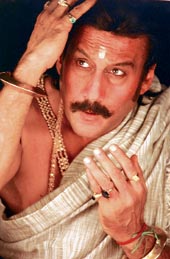 |
| Suchitra Sen and Dilip Kumar in Devdas, scripted by Nabendu Ghosh (below) |
 |
This month, he steps into his 90s but few in Calcutta remember his contribution to films like Abhimaan, Aar Paar, Devdas and Teesri Kasam. Yet, writer-director Nabendu Ghosh shows no sign of quitting.
Away from the Bollywood mainstream for nearly a decade, he is happy rekindling his literary career that had once propelled him to filmdom. He has two books, Jibaner Shadh and Bichitra Prem Gathan, lined up for release and is now busy penning his autobiography.
Ghosh, whose directorial debut Trishagni (Nana Patekar, Pallavi Joshi, Nitish Bharadwaj) had won a National Award, is also waiting for a final nod from NFDC for a feature film on a Kamal Kumar Majumdar story about the spiritual journey of a Christian priest. And then his script for Aaguner Ukti is scheduled to take on a Bollywood avatar.
Ghosh has never got his due credit in the 48 years he has served the film industry. ?My name was missing from the credits of Aar Paar which I had written for Guru Dutt but I didn?t really care,? he recalls. ?I was there to make money, I wasn?t hungry for fame like the rest. Writing has always been a passion, never a career.?
It was Ghosh?s anti-British book Dak Diye Jaye which drew the attention of director Bimal Roy whose film Udayer Pathe was then making waves all over. ?He offered to take me in his team because he found cinematic elements in my writing,? gushes the old man at his Lake Gardens residence.
Following Bimal Roy to Mumbai, Ghosh created his own exclusive space. He remembers turning the story of Jheel Ke Us Paar on its head just to give Dharmendra his first major break in Bollywood. He remembers scripting for the Ashok Kumar?Meena Kumari version of Parineeta. He remembers writing for the likes of Hrishikesh Mukherjee, Asit Sen, Shakti Samant, Atma Ram, Phani Majumdar, Sushil Majumdar? ?There were times when I was juggling five or six scripts at one go,? Ghosh says.
And he doesn?t disapprove of today?s Bollywood. ?I am not one of those oldies who opposes change,? Ghosh affirms. ?I believe change is natural and necessary. The new technology, even the shot break-up, is very different today but that just adds to the smartness of the films.?
Ghosh still doesn?t mind watching films, even if it is only on the small screen. ?One cannot hope to address the changed audience without a change in outlook. But if a director has to match his language and pace to that of his viewers, he must give the story its due. Only the authenticity of the basic emotions depicted by Sarat Chandra Chattopadhyay made the new Parineeta work despite all the distortions inflicted on it,? says Ghosh. His latest assignment is writing a script for his Mumbai-based son Shubhankar Ghosh, who after FTII and films like Woh Chhokri, now hopes to foray into Bengali films.

